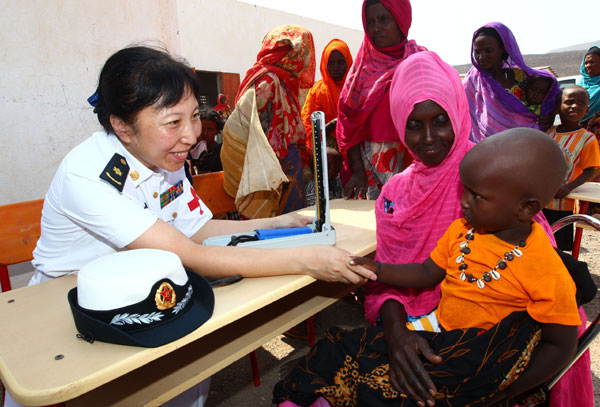 |
|
A medical officer of the Chinese navy hospital ship Peace Ark provides service to nomad tribe residents in the Republic of Djibouti on Sept 28, 2010. Cha Chunming / Xinhua |
The Chinese Center for Disease Control and Prevention, which joined the World Health Organization's Stop Transmission of Polio Program in 2011, has sent three experts to Africa to help launch the program there.
In July 2011, two experts in epidemiology at the Chinese CDC successfully applied to volunteer for the program.
In October, after two weeks of training at the US Centers for Disease Control and Prevention, Yin Zundong, deputy director of The Third Division of Epidemiological Surveillance, National Immunization Program and the Chinese CDC, was sent to Nigeria, while Xia Wei, an epidemiologist, went to Namibia.
The two were the first experts the Chinese health authorities sent as part of the program.
The 36-year-old Yin, who has been working in the Chinese CDC for seven years, said he was one of more than 10 experts from different countries the STOP Program selected and sent to Nigeria at that time.
He was working with experts from the WHO, The United Nations Children's Fund and Nigerian health authorities to formulate vaccination projects against polio and meningococcal meningitis and supervise and evaluate the implementation of the projects.
Yin said Nigeria is the only African country where polio remains endemic. What's more, it is in Africa's "meningitis belt", which means the country has a higher rate of meningitis than most others on the continent.
"I worked in two rounds of supplementary immunization activities against polio targeted at children under 5 years old and an immunization project against meningitis there," Yin said.
Meanwhile, his colleague Xia Wei was the only one being sent to Namibia among the experts sent for the STOP Program missions at the time.
Xia's job was to evaluate the southern African country's active surveillance system against vaccine-preventable diseases and its cold-chain system, the routes where vaccines are stored and transported and give advice to the national health authorities.
"The health officials there would very much like to learn from China's experience in making immunization projects and building a public health system," Xia said. Given Namibia's low population density, he noted: "I could share with them how we carried out health programs in Qinghai province, even in the Xinjiang Uygur autonomous region and the Tibet autonomous region."
Yin said his Nigerian hosts also were interested in what they could learn from China. "Nigerian people are very friendly to Chinese people. They are also eager to learn from China's experience in public health. China is the most populated country in the world, and Nigeria is the most populated country in Africa. The similarity allows the two countries to share experience on making public health policies."
In addition to Yin and Xia, an expert at the Zhejiang provincial center for disease control and prevention also volunteered in the African country of Ethiopia from February to April for the STOP Program.
Initiated in 1998, the STOP Program is carried out by the US CDC, WHO and UNICEF and aims to stop the spread of polio. The program's focuses on Africa and South Asia.
Luo Huiming, deputy director of the National Immunization Program (NIP) of the Chinese CDC, said, "Wang Yu, director of the Chinese CDC, has been encouraging us to join international public health programs. China has many programs of providing medical assistance to African countries, but this (joining the STOP Program) is a very important step for us to join the international efforts of public health."
wangqingyun@chinadaily.com.cn
